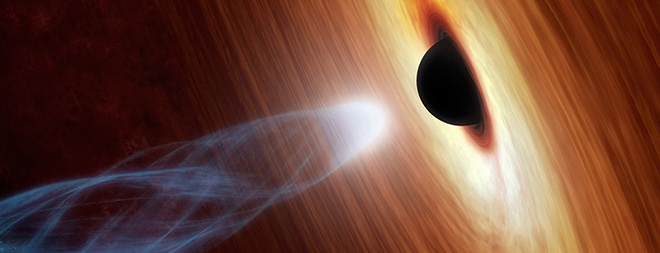| Topic: Quantum gravity takes singularity out of black holes | |
|---|---|
|
Quantum gravity takes singularity out of black holes
12:17 29 May 2013 by Katia Moskvitch For similar stories, visit the Cosmology Topic Guide Falling into a black hole may not be as final as it seems. Apply a quantum theory of gravity to these bizarre objects and the all-crushing singularity at their core disappears. In its place is something that looks a lot like an entry point to another universe. Most immediately, that could help resolve the nagging information loss paradox that dogs black holes. Though no human is likely to fall into a black hole anytime soon, imagining what would happen if they did is a great way to probe some of the biggest mysteries in the universe. Most recently this has led to something known as the black hole firewall paradox – but black holes have long been a source of cosmic puzzles. According to Albert Einstein's theory of general relativity, if a black hole swallows you, your chances of survival are nil. You'll first be torn apart by the black hole's tidal forces, a process whimsically named spaghettification. Eventually, you'll reach the singularity, where the gravitational field is infinitely strong. At that point, you'll be crushed to an infinite density. Unfortunately, general relativity provides no basis for working out what happens next. "When you reach the singularity in general relativity, physics just stops, the equations break down," says Abhay Ashtekar of Pennsylvania State University. The same problem crops up when trying to explain the big bang, which is thought to have started with a singularity. So in 2006, Ashtekar and colleagues applied loop quantum gravity to the birth of the universe. LQG combines general relativity with quantum mechanics and defines space-time as a web of indivisible chunks of about 10-35 metres in size. The team found that as they rewound time in an LQG universe, they reached the big bang, but no singularity – instead they crossed a "quantum bridge" into another older universe. This is the basis for the "big bounce" theory of our universe's origins. Information paradox Now Jorge Pullin at Louisiana State University and Rodolfo Gambini at the University of the Republic in Montevideo, Uruguay, have applied LQG on a much smaller scale – to an individual black hole – in the hope of removing that singularity too. To simplify things, the pair applied the equations of LQG to a model of a spherically symmetrical, non-rotating "Schwarzschild" black hole. In this new model, the gravitational field still increases as you near the black hole's core. But unlike previous models, this doesn't end in a singularity. Instead gravity eventually reduces, as if you've come out the other end of the black hole and landed either in another region of our universe, or another universe altogether. Despite only holding for a simple model of a black hole, the researchers – and Ashtekar – believe the theory may banish singularities from real black holes too. That would mean that black holes can serve as portals to other universes. While other theories, not to mention some works of science fiction, have suggested this, the trouble was that nothing could pass through the portal because of the singularity. The removal of the singularity is unlikely to be of immediate practical use, but it could help with at least one of the paradoxes surrounding black holes, the information loss problem. A black hole soaks up information along with the matter it swallows, but black holes are also supposed to evaporate over time. That would cause the information to disappear forever, defying quantum theory. But if a black hole has no singularity, then the information needn't be lost – it may just tunnel its way through to another universe. "Information doesn't disappear, it leaks out," says Pullin. Journal reference: Physical Review Letters, doi.org/mnm http://www.newscientist.com/article/dn23611-quantum-gravity-takes-singularity-out-of-black-holes.html |
|
|
|
|
|
Very intresting, have you ever heard the film called 'what the bleep do we know?' the film is all about that theory.
|
|
|
|
|
|
Quantum gravity takes singularity out of black holes 12:17 29 May 2013 by Katia Moskvitch For similar stories, visit the Cosmology Topic Guide Falling into a black hole may not be as final as it seems. Apply a quantum theory of gravity to these bizarre objects and the all-crushing singularity at their core disappears. In its place is something that looks a lot like an entry point to another universe. Most immediately, that could help resolve the nagging information loss paradox that dogs black holes. Though no human is likely to fall into a black hole anytime soon, imagining what would happen if they did is a great way to probe some of the biggest mysteries in the universe. Most recently this has led to something known as the black hole firewall paradox – but black holes have long been a source of cosmic puzzles. According to Albert Einstein's theory of general relativity, if a black hole swallows you, your chances of survival are nil. You'll first be torn apart by the black hole's tidal forces, a process whimsically named spaghettification. Eventually, you'll reach the singularity, where the gravitational field is infinitely strong. At that point, you'll be crushed to an infinite density. Unfortunately, general relativity provides no basis for working out what happens next. "When you reach the singularity in general relativity, physics just stops, the equations break down," says Abhay Ashtekar of Pennsylvania State University. The same problem crops up when trying to explain the big bang, which is thought to have started with a singularity. So in 2006, Ashtekar and colleagues applied loop quantum gravity to the birth of the universe. LQG combines general relativity with quantum mechanics and defines space-time as a web of indivisible chunks of about 10-35 metres in size. The team found that as they rewound time in an LQG universe, they reached the big bang, but no singularity – instead they crossed a "quantum bridge" into another older universe. This is the basis for the "big bounce" theory of our universe's origins. Information paradox Now Jorge Pullin at Louisiana State University and Rodolfo Gambini at the University of the Republic in Montevideo, Uruguay, have applied LQG on a much smaller scale – to an individual black hole – in the hope of removing that singularity too. To simplify things, the pair applied the equations of LQG to a model of a spherically symmetrical, non-rotating "Schwarzschild" black hole. In this new model, the gravitational field still increases as you near the black hole's core. But unlike previous models, this doesn't end in a singularity. Instead gravity eventually reduces, as if you've come out the other end of the black hole and landed either in another region of our universe, or another universe altogether. Despite only holding for a simple model of a black hole, the researchers – and Ashtekar – believe the theory may banish singularities from real black holes too. That would mean that black holes can serve as portals to other universes. While other theories, not to mention some works of science fiction, have suggested this, the trouble was that nothing could pass through the portal because of the singularity. The removal of the singularity is unlikely to be of immediate practical use, but it could help with at least one of the paradoxes surrounding black holes, the information loss problem. A black hole soaks up information along with the matter it swallows, but black holes are also supposed to evaporate over time. That would cause the information to disappear forever, defying quantum theory. But if a black hole has no singularity, then the information needn't be lost – it may just tunnel its way through to another universe. "Information doesn't disappear, it leaks out," says Pullin. Journal reference: Physical Review Letters, doi.org/mnm http://www.newscientist.com/article/dn23611-quantum-gravity-takes-singularity-out-of-black-holes.html 
|
|
|
|
|
|
Quantum gravity takes singularity out of black holes 12:17 29 May 2013 by Katia Moskvitch For similar stories, visit the Cosmology Topic Guide Falling into a black hole may not be as final as it seems. Apply a quantum theory of gravity to these bizarre objects and the all-crushing singularity at their core disappears. In its place is something that looks a lot like an entry point to another universe. Most immediately, that could help resolve the nagging information loss paradox that dogs black holes. Though no human is likely to fall into a black hole anytime soon, imagining what would happen if they did is a great way to probe some of the biggest mysteries in the universe. Most recently this has led to something known as the black hole firewall paradox – but black holes have long been a source of cosmic puzzles. According to Albert Einstein's theory of general relativity, if a black hole swallows you, your chances of survival are nil. You'll first be torn apart by the black hole's tidal forces, a process whimsically named spaghettification. Eventually, you'll reach the singularity, where the gravitational field is infinitely strong. At that point, you'll be crushed to an infinite density. Unfortunately, general relativity provides no basis for working out what happens next. "When you reach the singularity in general relativity, physics just stops, the equations break down," says Abhay Ashtekar of Pennsylvania State University. The same problem crops up when trying to explain the big bang, which is thought to have started with a singularity. So in 2006, Ashtekar and colleagues applied loop quantum gravity to the birth of the universe. LQG combines general relativity with quantum mechanics and defines space-time as a web of indivisible chunks of about 10-35 metres in size. The team found that as they rewound time in an LQG universe, they reached the big bang, but no singularity – instead they crossed a "quantum bridge" into another older universe. This is the basis for the "big bounce" theory of our universe's origins. Information paradox Now Jorge Pullin at Louisiana State University and Rodolfo Gambini at the University of the Republic in Montevideo, Uruguay, have applied LQG on a much smaller scale – to an individual black hole – in the hope of removing that singularity too. To simplify things, the pair applied the equations of LQG to a model of a spherically symmetrical, non-rotating "Schwarzschild" black hole. In this new model, the gravitational field still increases as you near the black hole's core. But unlike previous models, this doesn't end in a singularity. Instead gravity eventually reduces, as if you've come out the other end of the black hole and landed either in another region of our universe, or another universe altogether. Despite only holding for a simple model of a black hole, the researchers – and Ashtekar – believe the theory may banish singularities from real black holes too. That would mean that black holes can serve as portals to other universes. While other theories, not to mention some works of science fiction, have suggested this, the trouble was that nothing could pass through the portal because of the singularity. The removal of the singularity is unlikely to be of immediate practical use, but it could help with at least one of the paradoxes surrounding black holes, the information loss problem. A black hole soaks up information along with the matter it swallows, but black holes are also supposed to evaporate over time. That would cause the information to disappear forever, defying quantum theory. But if a black hole has no singularity, then the information needn't be lost – it may just tunnel its way through to another universe. "Information doesn't disappear, it leaks out," says Pullin. Journal reference: Physical Review Letters, doi.org/mnm http://www.newscientist.com/article/dn23611-quantum-gravity-takes-singularity-out-of-black-holes.html 
it might be a possibility... 
|
|
|
|
|
|
Very intresting, have you ever heard the film called 'what the bleep do we know?' the film is all about that theory. thank you, i'll look that up 
|
|
|
|
|
|
Definitely over my head, but theoretical physics is cool nonetheless.
|
|
|
|
|
|
Do they mean that gravititional field of the black hole isn't constant on both ends? This is like portals right? If i am to pass through this hole and end up somewhere, how can i come back if the other end doesnt exert the same field of energy. Is it just one way street?
|
|
|
|
|
|
Edited by
mightymoe
on
Fri 05/31/13 12:47 PM
|
|
|
Do they mean that gravititional field of the black hole isn't constant on both ends? This is like portals right? If i am to pass through this hole and end up somewhere, how can i come back if the other end doesnt exert the same field of energy. Is it just one way street? all theory, but you are close... they are saying that center of the black hole might be different from what the theory is know. the quantum suggests that center doesn't have a gravitational pull like they thought, that it could be a doorway to another universe/dimention... the old theory suggests a singularity at the center, with gravitional forces beyond anything we can concieve. the quantum suggests no singularity, but rather the closer you get to the center, the less gravity is felt... that in turn suggested an exit point to somewhere else... |
|
|
|
|
|
all theory, but you are close... they are saying that center of the black hole might be different from what the theory is know. the quantum suggests that center doesn't have a gravitational pull like they thought, that it could be a doorway to another universe/dimention... the old theory suggests a singularity at the center, with gravitional forces beyond anything we can concieve. the quantum suggests no singularity, but rather the closer you get to the center, the less gravity is felt... that in turn suggested an exit point to somewhere else... Hmm, your saying that both ends have constant gravitational pull, if so it must also contain the consistency for both ends exerts a strong pull of energy . Im thinking that the center wont give you access to any dimention for as they theorirized it has lesser gravity. Maybe an object or a person maybe stock on its center not to any other area but to its hole's center only, not an exit to the other dimention. |
|
|
|
|
|
all theory, but you are close... they are saying that center of the black hole might be different from what the theory is know. the quantum suggests that center doesn't have a gravitational pull like they thought, that it could be a doorway to another universe/dimention... the old theory suggests a singularity at the center, with gravitional forces beyond anything we can concieve. the quantum suggests no singularity, but rather the closer you get to the center, the less gravity is felt... that in turn suggested an exit point to somewhere else... Hmm, your saying that both ends have constant gravitational pull, if so it must also contain the consistency for both ends exerts a strong pull of energy . Im thinking that the center wont give you access to any dimention for as they theorirized it has lesser gravity. Maybe an object or a person maybe stock on its center not to any other area but to its hole's center only, not an exit to the other dimention. no, i'm saying i don't know...lol but i do like thinking about these things tho... we can't be sure about the "otherside", as we can only see one side... |
|
|
|
|
|
They are using models. They sure should have done it through trial and error. But we cant be certain that this models will represent the true black hole if there is really..
|
|
|
|
|
|
They are using models. They sure should have done it through trial and error. But we cant be certain that this models will represent the true black hole if there is really.. they are all too far away for trail and error, everything is pure speculation and mathmatics... there is something there, but nobody knows what exactly... |
|
|
|
|
|
It keeps me wondering, do you think there is only one door to the blackhole and when you exited youre already in another universe? Haha, i should quit reading much scifi stories.
|
|
|
|
|
|
Edited by
mightymoe
on
Wed 06/05/13 08:09 AM
|
|
|
It keeps me wondering, do you think there is only one door to the blackhole and when you exited youre already in another universe? Haha, i should quit reading much scifi stories. here is some different info about it... The cores of black holes may not hold points of infinite density as currently thought, but portals to elsewhere in the universe, theoretical physicists say. A black hole possesses a gravitational field so powerful that not even light can escape. A black hole generally forms after a star dies in a titanic explosion known as a supernova, which crushes the remaining core into dense lumps. 
Artist’s concept of a supermassive black hole Image credit: NASA/JPL-Caltech A maddening enigma called a singularity — a region of infinite density — lies at the heart of each black hole, according to general relativity, the modern theory of gravity. The infinite nature of singularities means that space and time as we know them cease to exist there. Scientists have long sought ways to avoid the complete breakdown of all the known laws of physics brought on by singularities. Now researchers suggest the centers of black holes may not hold singularities after all. These new findings are based on loop quantum gravity, one of the leading theories seeking to unite quantum mechanics and general relativity into a single theory that can explain all the forces of the universe. In loop quantum gravity, the four dimensions of spacetime are composed of networks of intersecting loops — ripples of the gravitational field. The researchers applied loop quantum gravity theory to the simplest model of black hole — a spherical, uncharged, non-rotating body known as a Schwarzschild black hole. “We have been looking at various aspects of spherical models for several years,” said researcher , a theoretical physicist at the Louisiana State University in Baton Rouge. “We like them because they are at the frontier of what is possible in loop quantum gravity today — a bit more complicated than the cosmologies that have been studied over the last decade, but not so complicated as to become intractable. An ‘aha’ moment was when we realized we can carry out an important simplification of the equations of the model.” Instead of a singularity, they found the center of this black hole only held a region of highly curved spacetime. “This is a clean treatment of what happens inside a black hole, using a quantum theory of gravity,” said theoretical physicist Carlo Rovelli at Aix-Marseille University in Marseille, France, who did not take part in this study. “It has long been expected that the singularities in the centers of black holes are cured by quantum gravity, and this is the conclusion that this work supports.” Theoretical physicists had previously shown that with loop quantum gravity, . Instead of emerging from a point of infinite density, their work proposed the cosmos was born from a “Big Bounce,” expanding outward after a prior universe collapsed. “Perhaps in the future it can be shown that all singularities are removed by the theory,” Pullin said. Just as loop quantum gravity replaced the singularity at the Big Bang with a bridge to another universe, these new findings replace each singularity in black holes with “a bridge to another region in the future of our universe,” Pullin said. Although prior studies also suggested black holes harbored such bridges, researchers had believed the singularities in black holes prevented any way of crossing those bridges. “I think that this shows that loop quantum gravity is very vital and bubbling, and continues to produce exciting new results and new ideas,” Rovelli said. Pullin emphasized that they used a very simple model in this study, consisting of only highly curved spacetime without representing the actual matter found inside real black holes. The models for the study were also exactly spherically symmetrical, unlike many black holes, which spin and thus differ across their surfaces. Finally, in their model the black hole was there forever and will be there forever — in reality, black holes generally form after the collapse of stars and should one day evaporate away if they no longer have matter or energy to devour. “Adding matter and having a black hole that evolves is what we are aiming for next,” Pullin said. Pullin and his colleague Rodolfo Gambini detailed their findings online May 23 in the journal Physical Review Letters. Contacts and sources:’ Inside Science News Service By Charles Q. Choi, ISNS Contributor |
|
|
|
|
|
Edited by
dovebear
on
Fri 06/07/13 09:58 AM
|
|
|
I have done much research on black holes and I have a very interesting theory I would like to share.
Try to visualize this: If you where able to somehow travel into a black hole, travel nearly to the edge of the singularity. Now that you are nearly on the edge of the singularity keep traveling towards it while at the same time shrinking your body equal to the distance you are traveling so that you never really reach the singularity. It would appear the singularity is growing larger relative to your body. Singularity's are like this. Relative to us on earth it may appear to be infinitely small. An absurd amount of matter crunched into an infinitely small point. But relative to the singularity the smaller it is crunched the more it appears to be growing larger. Shrinking is growing in the negative if you can imagine that. So the singularity is crunched so much that it folds inside out and pushed outwards into another dimension, another universe. It may seem the matter disappears but is in fact pushing outwards into negative space so to speak. Like a miniature big bang, and most likely in this infinitely small point is a whole universe and the inside out folding of the singularity is a big bang on a super microscopic level. The matter doesn't disappear and scientists can rest easy about the information paradox. The matter is just transformed and pushed out into parallel universes. And our universe as we know it is most likely the result of this as well, the big bang is possibly just a star that exploded in a much grander universe that collapsed into a black hole and is crunching the matter so tight that it spewed out space and time into negative space that created the big bang :) Imagine the universe as a super solid structure of all space and time that happens all at once, the past, future and present all at once. This would be a singularity. It is consciousness that divides the time into segments and allows us to experience the universe like we do, If there was no life the universe would just be a super dense solid structure of all space and time compact into a timeless singularity. Just my theory. hope it made sense. |
|
|
|
|











